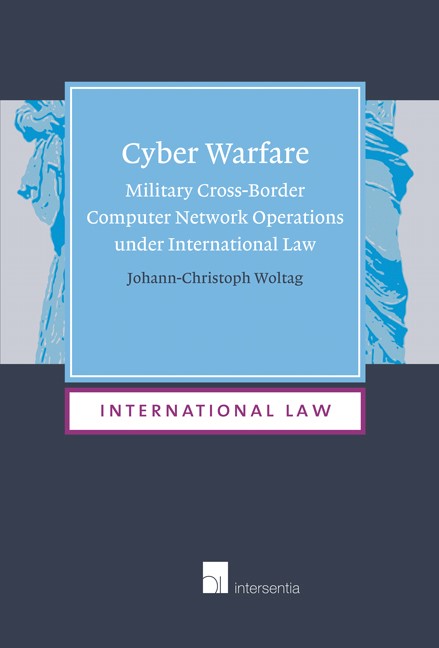Book contents
- Frontmatter
- Dedication
- Acknowledgements
- Contents
- Abbreviations
- Introduction
- PART I THE INTERNET AS A UNIVERSAL YET TERRITORIALISED INFRASTRUCTURE
- PART II THE LEGAL QUALIFICATION OF COMPUTER NETWORK OPERATIONS
- Chapter 3 Computer Network Operations Outside of Armed Conflict
- Chapter 4 The Justified Use of Forceful Computer Network Operations
- Chapter 5 Computer Network Operations During an International Armed Conflict
- Chapter 6 Neutrality in Cyber Warfare
- PART III CONCLUSION
- Bibliography
Chapter 3 - Computer Network Operations Outside of Armed Conflict
from PART II - THE LEGAL QUALIFICATION OF COMPUTER NETWORK OPERATIONS
Published online by Cambridge University Press: 28 November 2017
- Frontmatter
- Dedication
- Acknowledgements
- Contents
- Abbreviations
- Introduction
- PART I THE INTERNET AS A UNIVERSAL YET TERRITORIALISED INFRASTRUCTURE
- PART II THE LEGAL QUALIFICATION OF COMPUTER NETWORK OPERATIONS
- Chapter 3 Computer Network Operations Outside of Armed Conflict
- Chapter 4 The Justified Use of Forceful Computer Network Operations
- Chapter 5 Computer Network Operations During an International Armed Conflict
- Chapter 6 Neutrality in Cyber Warfare
- PART III CONCLUSION
- Bibliography
Summary
The legal appraisal of military computer network operations under international law serves several purposes, depending on the relevant regime applicable. When considering military operations a division will naturally be drawn between the regimes applicable during and outside of armed conflict. During armed conflict the legal qualification of military computer network operations is necessary in order to be able to fulfil humanitarian law obligations. Outside of armed conflict, under the ius ad bellum paradigm, the necessity lies in being able to justify the use of force directed against another State as a means of self-defence. More cardinally, the qualification of a computer network operation as an internationally wrongful act of a State invokes its responsibility. The first step in any claim to restitution and reparation or ultimately any justification of countermeasures will thus lie in the legal appraisal of the relevant operation.
In the following, a legal qualification of computer network operations will be undertaken in ascending order, dependent on the level of harm expected to be inflicted. This firstly concerns those operations that are taken outside of armed conflict and which do not reach the quality of armed force in the sense of the UN Charter, followed by those which do transgress this threshold and ultimately those taken during international armed conflict.
As with other forms of military operations, the possibility of computer network operations not amounting to armed force in the sense of the prohibition of Article 2(4) UN Charter is a given. After all, taking into consideration the aforementioned case studies it is conceivable that the lion's share of CNOs lies in this area, and will likely remain so also in the future. This does not mean that such activities will automatically be in conformity with international law. If CNOs for example qualify as coercion but not as armed force, the overall principle of non-intervention, of which the rules on the use of armed force are a specific application, might be affected. But depending on the relevant regimes or bilateral treaties applicable, the conduct of military operations in cyberspace may be identified as an unlawful act from many different angles.
- Type
- Chapter
- Information
- Cyber WarfareMilitary Cross-Border Computer Network Operations under International Law, pp. 85 - 174Publisher: IntersentiaPrint publication year: 2014

